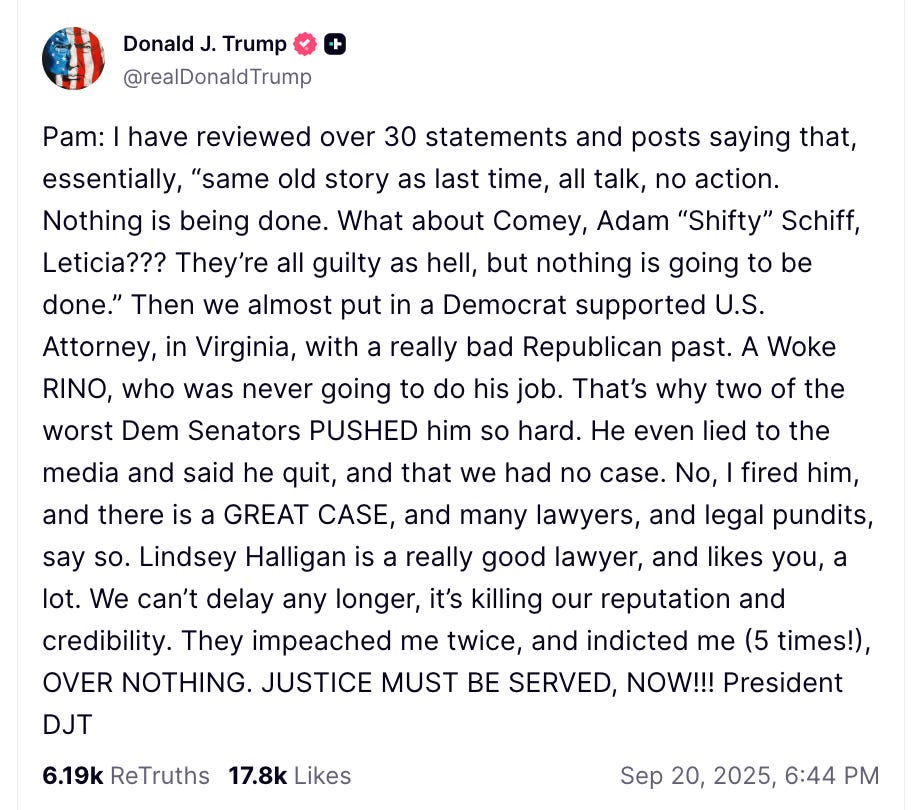In the wake of the 2008 Fiscal Crisis, federal bank regulators required major banks to undergo “stress tests” to see how the bank’s finances would do in another fiscal crisis? Would they have the capital to survive? Would they require a bailout. As horrified as I am about much of the abuses by the Trump Administration, Trump is serving an important function: he is “stress testing” our democracy and identifying all the various ways that an authoritarian President could abuse the authority given the President by Congress, as well as the unenforceable “norms” that traditionally limited Presidential power.
In a previous post, I started a list of changes Congress needs to make to pull back the often extraordinary emergency powers given to Presidents. In this post, I want to focus on addressing the latest issue—Trump’s demand that the Department of Justice bring criminal cases—regardless of the merits—against his political enemies.
After the Nixon Presidency, the Department of Justice leadership developed policies to protect its independence in individual cases from political interference. Attorney Generals in both Democratic and Republican Administrations issued formal policies to restrict communications with the White House on specific law enforcement matters. Under these policies, the White House was generally not advised on individual cases, and any communications that did occur had to be through specific high-ranking officials such as the Attorney General, the Deputy Attorney General and the White House Counsel. The DoJ Manual also set force strict policies about impartiality, including that all legal judgments be “impartial and insulated from political influence” and that DoJ’s “investigatory and prosecutorial powers” must be “exercised free from partisan consideration”.
These are not legal requirements, but were instead merely internal policies and norms. While DoJ attorneys could be disciplined for violating these policies, there was no enforcement mechanism if the White House or senior DoJ officials violated the policies.
Despite the fact that these were merely norms and internal policies, this system of restraint worked very well for decades. The norm of DoJ independence in individual cases was generally respected by all Presidents—until now. Trump has effectively ignored the norms and policies and is asserting his right to direct the Department of Justice.
Clearly the lesson here is that norms are not enough. What more can be done? Andrew Tessman, a former Assistant U.S. Attorney wrote an op-ed giving some suggestions:
Congress should formalize the Justice Department’s independence, making clear that prosecutorial decisions cannot be directed or manipulated by the president or political operatives. Reforms should include statutory limits on presidential interference in charging decisions, such as requiring that all communications from the White House to the Justice Department be in writing and reviewable by Congress; greater protections for U.S. attorneys against politically motivated termination; transparency requirements when cases are referred by the White House; and enhanced oversight by Congress when the DOJ is asked to investigate political figures.
These are all very good suggestions because they convert existing norms and policies into statutory requirements. We could also extend the existing criminal statute prohibiting the President, the Vice President, any employee of the executive office of the President, and any employee of the executive office of the Vice President from requesting the IRS “to conduct or terminate an audit or other investigation of any particular taxpayer with respect to the tax liability of such taxpayer” to include requests to DoJ in criminal matters as well.
Nonetheless, all of these ideas beg the question: who would enforce these requirements? If these were in force today, do we really think Pam Bondi would take legal action if Trump violated them? In addition, I am concerned that the current Supreme Court—with its apparent strong views on the scope of executive power and executive privilege—would hold that many of these restrictions on the internal communications of the Executive Branch are unconstitutional.
So how do we address this enforcement problem? One potential approach would be to give criminal defendants a full defense in criminal cases if any White House official requested the investigation or criminal prosecution of the defendant. To prevent unfair political investigations, we could give those being investigated at the direction of the White House a right to a court order stopping the investigation as well. Congress clearly has the authority to set out the elements of federal crimes, as well as defense, so this should pass Supreme Court scrutiny.
This clearly requires some thought and I welcome you to come up with solutions as well. The bottom-line is that Trump is stress testing our democracy and we cannot return to the old ways or norms and policies in the future.


